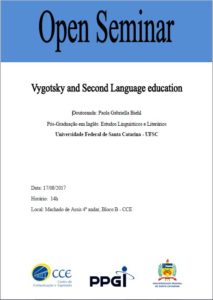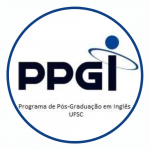-
Open Seminar – L2 teacher education: professional development from a sociocultural perspective
Publicado em 31/07/2017 às 14:58 02Mon, 31 Jul 2017 14:58:27 +000027.O PPGI convida todos a participar do Open Seminar – L2 teacher education: professional development from a sociocultural perspective que será ministrado pela doutoranda Maria Rosa Costa.
Data: 17/08/2017
Horário: 15h
Local: Machado de Assis 4ºandar, Bloco B – CCE -
Open Seminar – Vygotsky and Second Language Education
Publicado em 28/07/2017 às 16:42 04Fri, 28 Jul 2017 16:42:07 +000007.O PPGI convida todos a participarem do Open Seminar – Vygotsky and Second Language Education que será ministrado pela doutoranda Paola Gabriella Biehl
Data: 17/08/2017
Horário: 14h
Local: Machado de Assis 4ºandar, Bloco B – CCE

-
Convite – Defesas
Publicado em 24/07/2017 às 16:58 04Mon, 24 Jul 2017 16:58:31 +000031.Título da Dissertação: “First Ladies: Analizing Scandal´s Main Female Characters”
Mestranda: Christelle Martine Abes
Data: 02/08/2017
Horário: 14h
Local: Sala 309, 3º Andar, Bloco B, CCEBanca:
Drª Claudia de Lima Costa (Orientadora/UFSC)
Dr Raphael de Boer Albuquerque (FURG)
Drª Maria Rita Drummond Viana (UFSC)
Título da Dissertação: “An ‘American’ Poet?: Nation and Identity in James Douglas Morrison’s The American Night (1991)”
Mestranda: Yasmim Pereira Yonekura
Data: 10/08/2017
Horário: 09h30 min
Local: Sala Machado de Assis, 4º Andar, Bloco B, CCEBanca:
Drª Magali Sperling Beck(Orientadora/UFSC)
Drª Maria Lúcia Milléo Martins(PPGI/UFSC)
Drª Maria Teresa Collares(IFSC/UFSC)
Drª Maria Rita Drummond Viana(UFSC – Suplente)
Título da Tese: “The process of English language teachers’ professional identity (re)construction at IFSC: An interpretative qualitative study”
Doutoranda: Fernanda Ramos Machado
Data: 25/08/2017
Horário: 08h30 min
Local: Sala 309, 3º Andar, Bloco B, CCEBanca:
Drª Glória Gil (Orientadora – UFSC)
Drª Marimar da Silva (IFSC)
Drª Didiê Ana Ceni Denardi (UTFPR – via Skype)
Dr Hamilton Godoy Wielewicki (UFSC)
Drª Adriana de Carvalho Kuerten Dellagnelo (UFSC – Suplente) -
Newsletter de julho 2017
Publicado em 18/07/2017 às 16:30 04Tue, 18 Jul 2017 16:30:29 +000029.É com grande prazer que anunciamos que a edição da Newsletter de julho encontra-se disponível em nosso site. A sexta edição de 2017 está disponível neste link.
-
O Programa de Pós-Graduação em Inglês
Publicado em 10/07/2017 às 16:58 04Mon, 10 Jul 2017 16:58:32 +000032.Divulga o edital N.º 14/2017/CCE de 05 de julho de 2017, que regulamenta a eleição para coordenador e vice coordenador do programa.
O edital pode ser conferido neste link.
-
Convite – Defesa
Publicado em 07/07/2017 às 14:40 02Fri, 07 Jul 2017 14:40:47 +000047.Título da Tese: “KOMUNYAKKA, CLARKE, AND PEREIRA: JAZZ, BLUES, AND SAMBA POETICS”
Doutoranda: Maristela Campos
Data: 12/07/2017
Horário: 09h
Local: Sala Machado de Assis, 4º Andar, Bloco B, CCEBanca:
Drª Maria Lúcia Milléo Martins(PPGI/UFSC)
Drª Neide Garcia Pinheiro(UNICENTRO/PR)
Drª Magali Sperling Beck(PPGI/UFSC)
Drª Eliana Ávila de Souza(PPGI/UFSC)
Drª Maria Teresa Collares(IFSC/UFSC – Suplente) -
Open Seminar – Allophonic Variation in L2 Speech
Publicado em 05/07/2017 às 14:14 02Wed, 05 Jul 2017 14:14:56 +000056.O PPGI convida todos a participarem do Open Seminar – Allophonic Variation in L2 Speech que será ministrado pela professora Drª. Christine Elizabeth Shea(University of Iowa)
Data: 10/07/2017
Horário: 14h
Local: Machado de Assis 4º andar, Bloco B – CCE -
Quadro de disciplinas de 2017/2
Publicado em 03/07/2017 às 17:27 05Mon, 03 Jul 2017 17:27:41 +000041.As disciplinas do semestre 2017/2 estão disponíveis e podem ser conferidas neste link.
-
Palestra – Pandora’s Box: Gender and Science in Short Stories by Women
Publicado em 03/07/2017 às 09:47 09Mon, 03 Jul 2017 09:47:41 +000041.O Programa de Pós-Graduação em Inglês e a Pós-Graduação em Estudos de Tradução convidam para a palestra “Pandora’s Box: Gender and Science in Short Stories by Women” com a Profª Ildney Cavalcanti (UFAL), a ser realizada no dia 03 de julho às 14:30 na sala 202 CCE-A.
-
Open Seminar – House of Cards: a trilogia de Dobbs, a série da BBC e a maxissérie da Netflix
Publicado em 28/06/2017 às 14:48 02Wed, 28 Jun 2017 14:48:20 +000020.O PPGI convida todos a participarem do Open Seminar – House of Cards: a trilogia de Dobbs, a série da BBC e a maxissérie da Netflix que será ministrado pela professora Drª Brunilda Reichmann (UNIANDRADE/PR)
Data: 15/08/2017
Horário: 10h30min
Local: Sala Drummond, térreo, Bloco B – CCE











